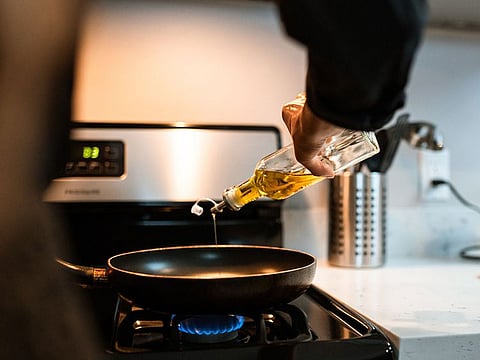How to cook without looking at recipes
Learn how to rely on your senses and become a better cook through tips shared

Also In This Package
Imagine a spread of delicious dishes on your family’s dining table during Eid, Diwali or Christmas – how many of them would you be able to make without looking at a recipe?
My mum, Asma Nayeem, a retired marketing communications manager, has been cooking based on her own tastes and sensibilities for decades. When I asked her how she makes elaborate meals without referring to a guide, she said it came down to something really simple.
“Just keep tasting as you cook. And if you’ve made a mistake, don’t panic. You can fix almost every issue one way or another.”
Just keep tasting as you cook. And if you’ve made a mistake, don’t panic. You can fix almost every issue one way or another.

Everyone knows if a dish tastes “off”, she explained – it’s just a matter of finding out what’s causing the issue and correcting it.
For instance, if your curry tastes too salty, add a peeled, raw potato to the dish, which will absorb the excess salt. If your stew is too spicy, chop a couple of tomatoes and add to the broth – it’ll dilute its effect.
These tricks are part of the experimenting process and make the experience both interesting and fun, according to my mum.
She said: “Cooking is a stress-buster. When you’re cooking, you use all your senses – your sight, hearing, smell, taste and touch – so there’s no time to think about other things. I also think your sixth sense, your intuition, is working, because you usually know if something is going wrong and you will want to adjust different ingredients to get it right.”
But, to just help readers of this article wishing to try these time-tested recipes, I've managed to get the exact measures from the home chefs as a starting point.
Asma's Suji Halwa
Ingredients:
Method:
One way to cook without recipes successfully is to build from what you know. It’s something Syed Mahmood Hussain, a 71-year-old retired businessman, has been doing for decades. He cooks lunch for his family almost every day, and the menu is always a surprise.
The Indian expat said: “I started cooking in the 1980’s, during my bachelor days. For me, cooking is a trial-and-error process. I rarely use recipes.”
The trick, according to Hussain, is in the proportions. He said: “Many Indian dishes have the same base – oil, onions, tomatoes, ginger, garlic, garam masala, and some spices. So, I experiment by changing the ratios, adding a little more of this, a little less of that. In the end, it all works out.”
Many Indian dishes have the same base... So, I experiment by changing the ratios, adding a little more of this, a little less of that. In the end, it all works out.

According to Hussain, people can learn to understand proportions and flavours when experimenting in the kitchen, but also when eating at restaurants, when trying new dishes during their travels, and when watching cooking shows or reading cookbooks. Knowledge gained from these experiences gives home cooks a better sense of which ingredients go together, which spices bring out flavours, and how a dish comes together.
Over the years, Hussain has developed 10 to 12 Indian dishes, like his own version of bhuna ghosht and biryani, which he cooks frequently.
Hussain's Mutton Biryani
Ingredients:
Method:
For Lynn Hazim, a Lebanese analytical consultant, a recipe doesn’t decide what she should cook – the contents of her fridge does.
The Dubai resident, who shares her culinary journey through @nosoupforyou on Instagram, said: “I always have a stocked-up pantry, fridge, and freezer, and I strongly believe this is key in getting you to cook more often and more creatively. You need to be limited by something, and in this case, the limit is the ingredients available at hand. This gets you to think about what you can create quickly and easily, and you’ll be more creative and come up with dishes you’ve never thought about before.”
I always have a stocked-up pantry, fridge, and freezer, and I strongly believe this is key in getting you to cook more often and more creatively.

Cooking without a guide may be a daunting task for many people, though, and Hazim said she understands that feeling of uncertainty. When she first started cooking at age 23, she used to follow recipes, and with time, gained the confidence to “freestyle” with whatever ingredients were available.
She said: “I really believe that when you first start cooking, you need to cook recipes of dishes you have already tried. This will really help you in problem solving as you go, because you know the end goal, you know what it should look like and what it should taste like, so you can adjust the recipe more comfortably, even with your limited cooking knowledge.”
Once you gain confidence, it’s just a matter of keeping at it in the kitchen. With time, aspects such as estimating the correct amount of ingredients, identifying when a dish is done, and getting your dish to have the right texture will get easier to master.
Hazim said: “I cook almost on a daily basis, and every day, I get slightly better than the day before. You will always make mistakes, even as an experienced cook, and with every mistake, you will learn something new in the kitchen, something that a recipe can’t really teach you, and this is ultimately what will really equip you to be a better cook.”
Hazim's Ricotta Gnocchi with Zaatar Butter and Sumac
Ingredients:
Method:




